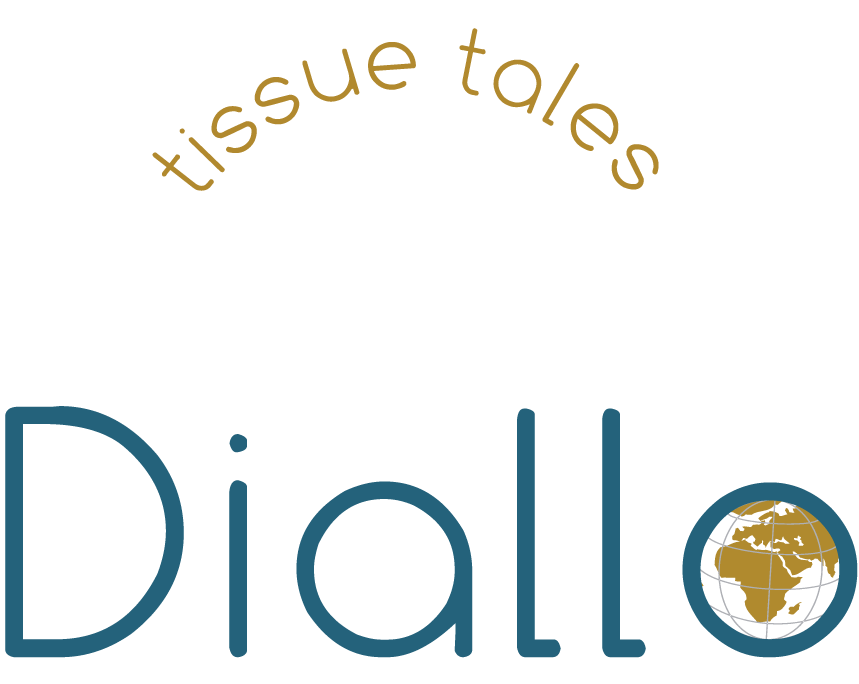(article published in Burkina Info 2/2025)
—-Scroll down to read the German and French version—-
Two labels, two visionaries, one common goal: Diallo tissue tales and kokoso show how fair trade and creative power can connect the world.
Trade, not Aid – Fabrics that build bridges
Since International Women’s Day, Faso dan Fani has also been at home in Berlin. In Florastraße in the Pankow district, one shop window immediately catches the eye. ‘Diallo tissue tales – culture-connecting fashion from Burkina Faso and Berlin’ it says. Behind it: handmade fashion, home textiles and bags made from colourful West African fabrics. Since 2021, the Diallo tissue tales brand has been combining West African craftsmanship with modern design – driven by the vision of its founder, Tanja Diallo, to create fair economic partnerships with producers in Burkina Faso.
The fabrics for her fashion and interior design collections – in particular Faso dan Fani (see box), a traditionally woven cotton fabric – are created in close cooperation with weavers. The artistically woven fabric panels are processed into fashion or home accessories in Berlin and Burkina Faso. Each piece tells a story: of craftsmanship, women’s empowerment and intercultural exchange. These stories can also be read on the blog at www.tissuetales.net/stoffgeschichten.
Tanja Diallo, a designer and editor with a Burkinabe family, has been travelling to Burkina Faso for more than three decades. Since 2019, she has been working with textile collectives, training centres and small workshops in Bobo Dioulasso and Ouagadougou. Even after the coup d’état in 2022, she remained connected to the country. ‘The security situation requires caution, but with planning and the experience of the local people, it is possible to live and work well in Burkina Faso. Despite the challenges posed by the attacks in the border areas, I sense a spirit of optimism, driven by pride, hospitality and renewal,’ says Diallo.
Weaving for a better life
At the heart of the project is the collaboration with the Vie Meilleure training centre in Bobo Dioulasso. There, young women – many of them deaf, rejected or refugees – are trained in weaving and tailoring. This gives them the prospect of a self-determined life. The aim is empowerment through sustainable work, not charity. In 2022, Tanja Diallo completed training on a mechanical loom with the women of Vie Meilleure – a physically and mentally demanding activity. The work requires patience, strength and concentration. Even setting up the weaving area is hard work: looms are positioned outdoors, 100 cotton threads are untangled to a length of up to 21 metres and protected as best as possible from the swirling dust of the Harmattan wind.
The creation of the first metre of fabric is a real experience – millimetre by millimetre, the wonderful woven fabric grows through the interaction of pedals, shuttles and combs. Under the guidance of her instructor Tensoba Ouoba and the association’s director Franceline, she learns not only the art of weaving, but also humility. The break with the women on the red earth, eating to together, the prayers in the storeroom, dyeing the strands of thread together in boiling water in the scorching heat, and the women’s incessant conversations in Dioula, filled with laughter. They revolve around the lengths of thread that need to be dyed for the patterns ordered, the recipes for the colours and the distribution of the work, and of course around God and the world and everything that happens in Bobo Dioulasso. The deaf women are involved in all processes through gestures and facial expressions – all of which makes the experience deeply moving on a human level.
Particularly impressive: Franceline Ouédraogo founded the association to give deaf and disadvantaged women a perspective. Many stay on in the business after their training – not only because of the income, but because they are part of a community. This lived empowerment shows what Diallo tissue tales is really about: participation, dignity and economic independence – woven from threads and trust.
kokoso – style with attitude
The Geneva-based bag brand kokoso also shares this approach of partnership and cooperation on equal terms. The label embodies a long history of love for craftsmanship, the people of Burkina Faso and African colours. Founder and artist Doris Margel-Hoppe has been working closely with four tailors in Bobo Dioulasso for over 15 years. In her Geneva studio, she designs artistic bags, which are manufactured in Burkina Faso – under fair conditions and in close coordination with the ‘kokoso family’. She also combines the fabrics – wax print, kokodunda, bogolan and Faso dan Fani – with recycled materials such as plastic scraps or fabric remnants to create unique designs. kokoso is part of SwissFairTrade.
During her stays in Burkina Faso’s cultural and commercial metropolis, Doris lives with the Kone family, who are involved in the project: she advises on fabric selection, organises the purchase and production of materials locally, and takes care of shipping and logistics. Working for kokoso ensures a decent income – and shows how respectful cooperation can work. Currently, in cooperation with Vie Meilleure, kokoso is creating its own fabric designs for the high-quality bag collection from Faso dan Fani.
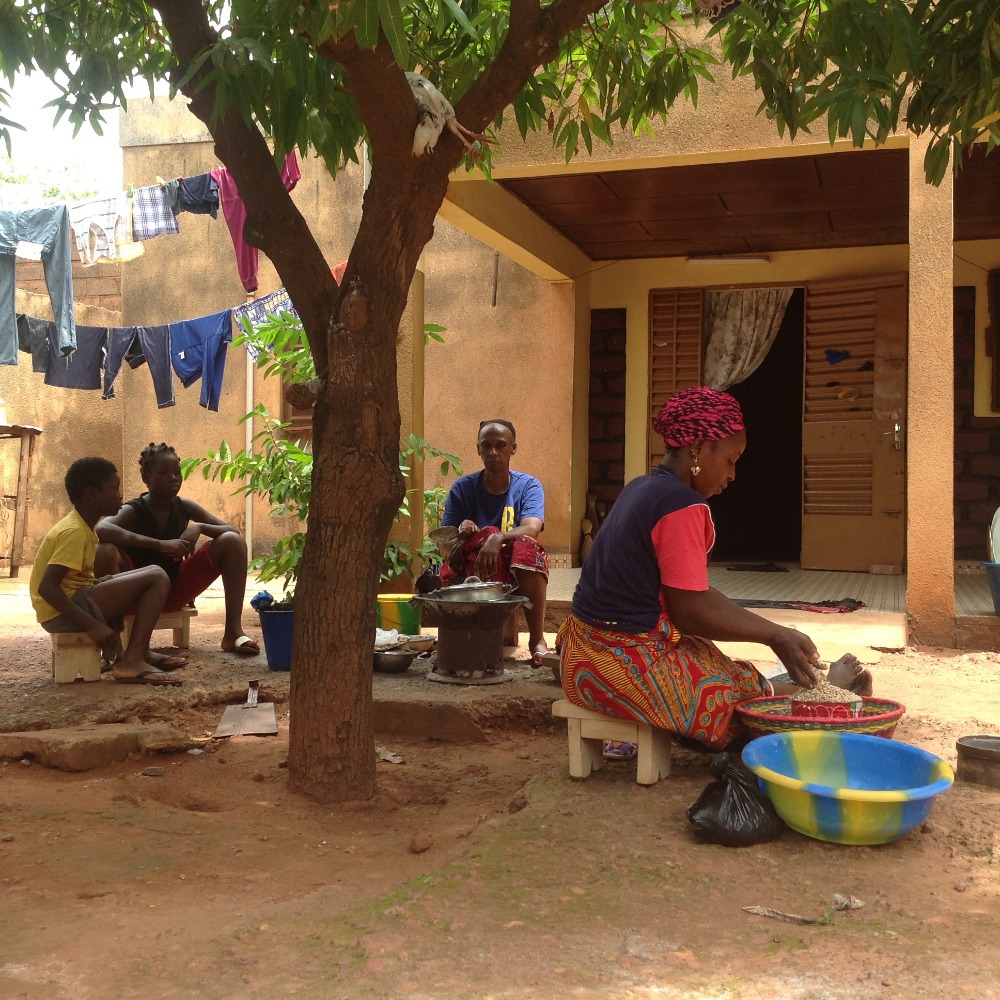
A new chapter: the planned manufacture in Bobo Dioulasso
Diallo and Margel-Hoppe met in Bobo Dioulasso in 2023 and quickly realised that they had a lot in common in terms of their values and visions. The kokoso boss has already succeeded in keeping the added value of her brand products in Burkina Faso by creating local jobs and securing the income of tailors through demand from Switzerland and Europe. Diallo tissue tales sees itself as an ambassador for the cultural wealth of Burkina Faso, with great empathy for the country and its people: through lectures and magazine articles, it is rewriting the narrative of the country, thereby raising awareness of decolonial economic concepts. It is also bringing the concept of African tailoring to Berlin and promoting sustainable slow fashion with global responsibility.
The next milestone for Diallo tissue tales and kokoso is the establishment of their own workshop for textile crafts, from weaving and knitting with Burkinabe cotton to dyeing with natural colours and sewing the finished materials into aesthetic products with cultural history. The factory complements the work of existing associations and aims to offer women career prospects. It aims to create space for creativity and craft production, where new ideas connecting cultures between Europe and Africa can emerge and be implemented. The purchase of a plot of land is currently being prepared – a complex process, accompanied by friends and real estate experts.
Growing together – a new understanding of cooperation
Both labels show that economic success and social responsibility are not mutually exclusive. It’s about ‘trade, not aid’: products from the Global South are marketed in the Global North as high-quality, culturally rooted design objects. The number of orders for the associations is growing slowly but steadily, thanks to the personal commitment of Diallo tissue tales and kokoso and their cooperation partners in Burkina Faso. Ultimately, the two entrepreneurs are concerned with much more than just products. It’s about attitude, courage and a new understanding of global cooperation. Diallo tissue tales and kokoso show that small can be big when respect, fairness and creativity hold the thread in their hands.
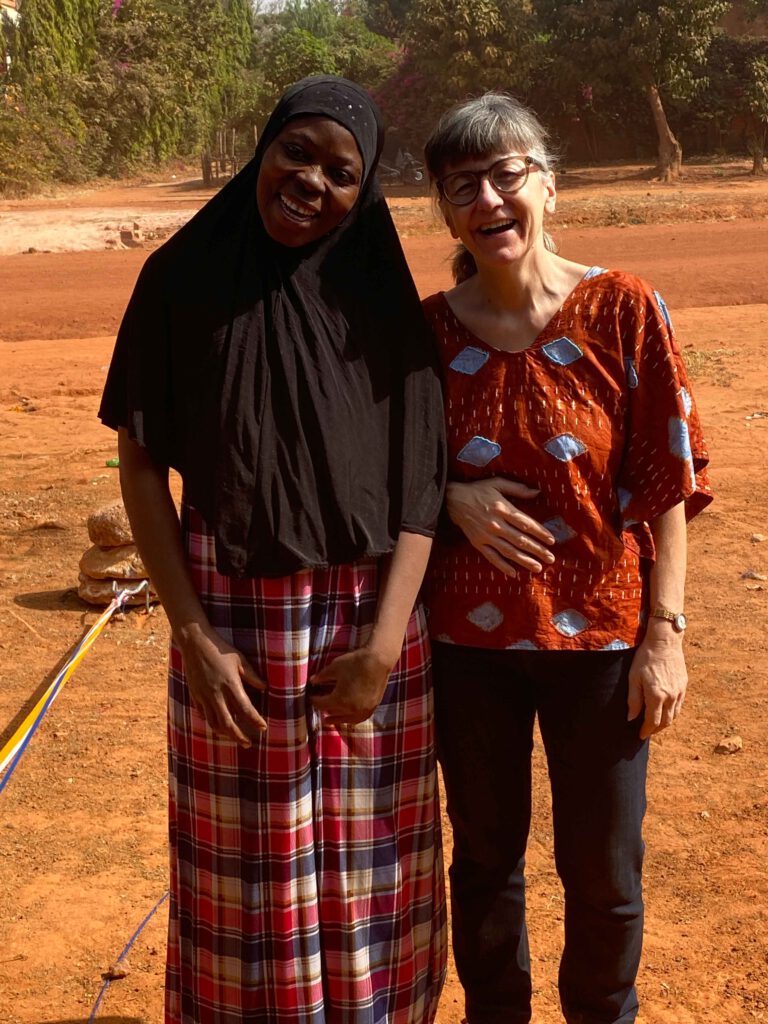
Begegnung in Bobo-Dioulasso: Partnerschaft auf Augenhöhe mit Herz und Humor.
„With Diallo tissue tales, I want to bring the message of a culturally and socially rich Africa to the world. I am convinced that with mutual understanding, we can create fair, decolonial trade models that are economically viable,“ says Tanja Diallo.
„At kokoso, we combine a love of craftsmanship with genuine partnership – and in doing so, we create added value for the people of Burkina Faso and for our joint creative work,“ adds Doris Margel-Hoppe.
The founders
Tanja Diallo
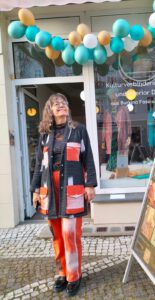
Tanja Diallo vor dem Berliner Showroom & Atelier von Diallo tissue tales
→ Founder of Diallo tissue tales
→ Locations: Berlin & Burkina Faso
→ Speciality: Tailor-made fashion & home décor from Faso Dan Fani
→ Goal: Fair cooperation and the advancement of women
→ Showroom & studio Berlin: Florastraße 80, 13187 Berlin
→ Opening hours: Mon–Fri 12 noon–6 p.m., Sat 10 a.m.–2 p.m.
→ Instagram: @tanja.diallo
Doris Margel-Hoppe
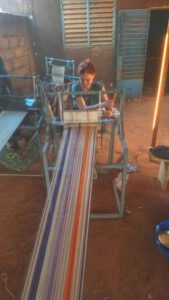
Tradition trifft Engagement: Doris Hoppe-Margel im Ausbildungszentrum Vie Meilleure.
→ Founder of kokoso
→ Locations: Geneva & Bobo Dioulasso
→ Speciality: Bags made from cotton & recycled materials
→ Goal: Sustainability & partnership on equal terms
→ Studio Geneva: 21 avenue des Tilleuls, CH-1203 Geneva
→ Instagram: @k.o.k.o.s.o
Faso dan Fani – Expression of cultural identity
The central symbol of Burkina Faso’s cultural wealth is Faso dan Fani, a relatively strong fabric made from locally grown cotton. There are various translations of the name: ‘woven loincloth from Burkina Faso’, ‘woven fabric of the country’ or ‘cloth that speaks’. Each design woven into the fabric carries a special message and reflects different facets of West African culture and history.
The fabric is not only used as a material for clothing, but is also a symbol of identity and craftsmanship in Burkina Faso. Since the October Revolution in 1983, the fabric has increasingly replaced Western clothing in Burkina. The charismatic 5th President of what was then Upper Volta, Thomas Sankara, positioned Faso dan Fani as a metaphor for liberation as early as 1986: „Wearing Faso dan Fani is an economic, cultural and political act of defiance against imperialism. In every village in Burkina Faso, we know how to grow cotton. In all villages, the women know how to spin cotton, the men know how to weave this thread into loincloths, and other men know how to sew these loincloths into clothes. We must not be slaves to what others produce.“
……………..
(Artikel aus Burkina Info 2/2025)
—-Scroll down to read the French version—-
Zwei Label, zwei Visionärinnen, ein gemeinsames Ziel: Diallo tissue tales und kokoso zeigen, wie fairer Handel und kreative Kraft die Welt verbinden können.
Trade, not Aid – Stoffe, die Brücken bauen
Seit dem internationalen Frauentag ist der Faso dan Fani auch in Berlin zu Hause. In der Florastraße im Stadtteil Pankow fällt ein Schaufenster sofort ins Auge. “Diallo tissue tales – kulturverbindende Mode aus Burkina Faso und Berlin” steht dort. Dahinter: handgefertigte Mode, Wohntextilien und Taschen aus farbenprächtigen, westafrikanischen Stoffen. Die Marke Diallo tissue tales verbindet seit 2021 westafrikanisches Handwerk mit modernem Design – getragen von der Vision ihrer Gründerin Tanja Diallo, faire wirtschaftliche Kooperationen mit Produzent:innen in Burkina Faso zu schaffen.
Die Stoffe für ihre Mode und Interior-Design-Kollektionen – insbesondere Faso dan Fani (siehe Kasten), ein traditionell gewebter, Baumwollstoff – entstehen in enger Kooperation mit Weberinnen. Die kunstvoll gewebten Stoffbahnen und werden in Berlin und Burkina Faso zu Mode oder Wohnaccessoires verarbeitet. Jedes Stück erzählt eine Geschichte: von Handarbeit, Frauenförderung und interkulturellem Austausch. Diese Geschichten sind auch im Blog nachzulesen, unter www.tissuetales.net/stoffgeschichten.
Die Designerin und Redakteurin mit burkinischer Familie reist Tanja Diallo seit mehr als drei Jahrzehnten nach Burkina Faso. Seit 2019 arbeitet sie mit Textilkollektiven, Ausbildungszentren und kleinen Werkstätten in Bobo Dioulasso und Ouagadougou zusammen. Auch nach dem Staatstreich 2022 blieb sie dem Land verbunden. „Die Sicherheitslage erfordert Umsicht, doch mit Planung, und der Erfahrung der Menschen vor Ort lässt sich gut in Burkina leben und arbeiten. Trotz der Herausforderungen durch die Überfälle in den grenznahen Gebieten spüre ich eine Aufbruchsstimmung, getragen von Stolz, Gastfreundschaft und Erneuerung“, sagt Diallo.
Weben für ein besseres Leben
Ein Herzstück des Projekts ist die Zusammenarbeit mit dem Ausbildungszentrum Vie Meilleure in Bobo Dioulasso. Dort werden junge Frauen – viele von ihnen gehörlos, verstoßen oder geflüchtet – im Weben und Schneidern ausgebildet. Sie erhalten so eine Perspektive auf ein selbstbestimmtes Leben. Der Anspruch: Empowerment durch nachhaltige Arbeit, nicht durch Almosen. Bei den Frauen von Vie Meilleure hat Tanja Diallo 2022 eine Ausbildung am mechanischen Webstuhl abgeschlossen – eine körperlich und geistig fordernde Tätigkeit. Die Arbeit verlangt Geduld, Kraft und Konzentration. Schon das Einrichten des Webplatzes ist Knochenarbeit: Webstühle werden im Freien positioniert, 100 Baumwollfäden auf bis zu 21 Metern entwirrt und so gut es geht gegen den aufwirbelnden Staub des Harmatan-Windes geschützt.
Die Entstehung des ersten Meters Stoff ist ein echtes Erlebnis – Millimeter für Millimeter, durch das Zusammenspiel von Pedalen, Schiffchen und Kamm wächst die wunderbare Webware. Unter Anleitung ihrer Ausbilderin Tensoba Ouoba und der Vereinsleiterin Franceline lernt sie nicht nur die Kunst des Webens, sondern auch Demut. Die Pause mit den Frauen auf der roten Erde, das gemeinsame Essen von To, die Gebete im Lagerraum, das gemeinsame Färben der Fadenstränge in kochendem Wasser bei sengender Hitze und die unablässigen, von Lachen erfüllten Gespräche der Frauen auf Dioula. Sie drehen sich um die Längen der Fadenstränge, die für die bestellten Muster gefärbt werden müssen, die Rezepturen der Farben und die Verteilung der Arbeiten und natürlich um Gott und die Welt und alles, was in Bobo Dioulasso passiert. Dabei werden die gehörlosen Frauen mit Gesten und Mimik in alle Prozesse einbezogen – all das macht die Erfahrung zu einer menschlich tief bewegenden.
Besonders eindrucksvoll: Franceline Ouédraogo gründete den Verein, um gehörlosen und benachteiligten Frauen eine Perspektive zu geben. Viele bleiben nach der Ausbildung im Betrieb – nicht nur wegen des Einkommens, sondern weil sie Teil einer Gemeinschaft sind. Dieses gelebte Empowerment zeigt, worum es Diallo tissue tales wirklich geht: Teilhabe, Würde und wirtschaftliche Eigenständigkeit – gewebt aus Fäden und Vertrauen.
kokoso – Stil mit Haltung
Auch die Taschenmarke kokoso, mit Sitz in Genf, teilt diesen Ansatz einer partnerschaftlichen Zusammenarbeit auf Augenhöhe. Das Label verkörpert eine lange Geschichte der Liebe zum Kunsthandwerk, zu den Menschen in Burkina Faso und zu afrikanischen Farben. Gründerin und Künstlerin Doris Margel-Hoppe arbeitet seit über 15 Jahren eng mit vier Schneidern in Bobo Dioulasso zusammen. In ihrem Genfer Atelier entwirft sie kunstvolle Taschen, gefertigt werden sie in Burkina Faso – unter fairen Bedingungen und in enger Abstimmung mit der „kokoso-Familie“. Die Stoffe – Waxprint, Kokodunda, Bogolan und Faso dan Fani – kombiniert sie auch mit recyceltem Material wie Kunststoffresten oder Stoffcoupons zu einzigartigen Kreationen. kokoso ist Teil von SwissFairTrade.
Während ihrer Aufenthalte in der burkinischen Kultur- und Handelsmetrople lebt Doris bei der Familie Kone, die in das Projekt eingebunden ist: Sie übernimmt die Beratung bei der Stoffwahl, organisiert den Kauf und die Herstellung der Materialien vor Ort und kümmert sich um Versand und Logistik. Die Arbeit für kokoso sichert ein würdiges Einkommen – und zeigt, wie respektvolles Miteinander funktionieren kann. Aktuell entstehen in Kooperation mit Vie Meilleure eigene Stoffdesigns für die hochwertige Taschenkollektion aus Faso dan Fani.

Ein neues Kapitel: Die geplante Manufaktur in Bobo Dioulasso
Diallo und Margel-Hoppe haben sich 2023 in Bobo Dioulasso kennen gelernt und schnell festgestellt, dass es viele Gemeinsamkeiten zwischen ihren Werten und Visionen gibt. Der kokoso-Chefin ist es bereits gelungen, die Wertschöpfung ihrer Markenprodukte in Burkina zu halten, indem sie vor Ort Arbeitsplätze schafft und das Einkommen der Schneider über die Nachfrage aus der Schweiz und Europa sichert. Diallo tissue tales sieht sich als Botschafterin des kulturellen Reichtums aus Burkina Faso mit großer Empathie für das Land und die Menschen Burkina Fasos: Mit Vorträgen und Magazinbeiträgen erzählt und schreibt sie das Narrativ des Landes neu und schafft so ein Bewusstsein für dekoloniale Wirtschaftskonzepte. Außerdem bringt sie das Konzept des afrikanischen Maßschnitts nach Berlin und setzt sich für nachhaltige Slow Fashion mit globaler Verantwortung ein.
Ein nächster Meilenstein für Diallo tissue tales und kokoso ist die Gründung einer eigenen Manufaktur für textiles Handwerk vom Weben, über das Stricken mit burkinischer Baumwolle, das Färben mit natürlichen Farben und das Nähen der gefertigten Materialien zu ästhetischen Produkten mit Kulturgeschichte. Die Manufaktur ergänzt die Arbeit der schon vorhandenen Vereine und soll Frauen eine berufliche Perspektive bieten. Sie soll Raum für Kreation und handwerkliche Produktion schaffen, in dem neue kulturverbindende Ideen zwischen Europa und Afrika entstehen und ungesetzt werden können. Derzeit wird der Kauf eines Grundstücks vorbereitet – ein komplexer Prozess, begleitet von Freund:innen und Immobilienexperten.
Gemeinsam wachsen – ein neues Verständnis von Zusammenarbeit
Beide Labels zeigen, dass wirtschaftlicher Erfolg und soziale Verantwortung kein Widerspruch sind. Es geht um „Trade, not Aid“: Produkte aus dem Globalen Süden werden als hochwertige, kulturell verwurzelte Designobjekte im Globalen Norden vermarktet. Die Zahl der Aufträge für die Vereine wächst langsam und stetig mit viel persönlichem Engagement von Diallo tissue tales und kokoso und den Kooperationspartner:innen in Burkina Faso. Am Ende geht es den beiden Unternehmerinnen um weit mehr als Produkte. Es geht um Haltung, Mut und ein neues Verständnis von globaler Zusammenarbeit. Diallo tissue tales und kokoso zeigen: klein kann ganz groß sein, wenn Respekt, Fairness und Kreativität den Faden in der Hand halten.
„Ich möchte mit Diallo tissue tales die Botschaft eines kulturell und sozial reichen Afrika in die Welt bringen. Ich bin überzeugt, dass wir mit gegenseitigem Verständnis, faire, dekoloniale Handelsmodelle schaffen können, die sich wirtschaftlich tragen“, sagt Tanja Diallo.
„Bei kokoso verbinden wir die Liebe zum Kunsthandwerk mit echter Partnerschaft – und schaffen so Mehrwert für die Menschen in Burkina Faso und für unsere gemeinsame kreative Arbeit“, ergänzt Doris Margel-Hoppe.
Die Gründerinnen
Tanja Diallo

→ Gründerin von Diallo tissue tales
→ Standorte: Berlin & Burkina Faso
→ Spezialität: Maßgeschneiderte Mode & Home-Deko aus Faso Dan Fani
→ Ziel: Faire Kooperation und Frauenförderung
→ Showroom & Atelier Berlin: Florastraße 80, 13187 Berlin
→ Öffnungszeiten: Mo–Fr 12–18 Uhr, Sa 10–14 Uhr
→ Instagram: @tanja.diallo
Doris Margel-Hoppe

→Gründerin von kokoso
→ Standorte: Genf & Bobo Dioulasso
→Spezialität: Taschen aus Baumwolle & Recyclingstoffen
→ Ziel: Nachhaltigkeit & Partnerschaft auf Augenhöhe
→ Atelier Genf : 21 avenue des Tilleuls, CH-1203 Genève
→Instagram : @k.o.k.o.s.o
Faso dan Fani – Ausdruck kultureller Identität
Das zentrale Symbol des kulturellen Reichtums von Burkina Faso ist der Faso dan Fani, ein aus lokal angebauter Baumwolle hergestelltes, relativ festes Gewebe. Zu dem Namen finden sich unterschiedliche Übersetzungen: „gewebter Lendenschurz aus Burkina Faso“, „gewebter Stoff des Landes“ oder „Tuch, das spricht“. Jedes in den Stoff eingewobene Design trägt eine besondere Botschaft und spiegelt unterschiedliche Facetten der westafrikanischen Kultur und Geschichte wider.
Der Stoff dient nicht nur als Material für Bekleidung, sondern ist auch ein Symbol für Identität und Handwerkskunst in Burkina Faso. Seit der Oktoberrevolution 1983 hat der Stoff westliche Kleidung in Burkina immer häufiger ersetzt. Der charismatische 5. Präsident des damaligen Obervolta, Thomas Sankara, positionierte den Faso dan Fani schon 1986 als Metapher der Befreiung: „Den Faso dan Fani zu tragen, ist ein wirtschaftlicher, kultureller und politischer Akt der Missachtung des Imperialismus. In jedem Dorf in Burkina Faso wissen wir, wie man Baumwolle anbaut. In allen Dörfern wissen die Frauen, wie man Baumwolle spinnt, die Männer wissen, wie man diesen Faden zu Lendentüchern webt, und andere Männer wissen, wie man diese Lendentücher zu Kleidern näht. Wir dürfen nicht Sklave dessen sein, was andere produzieren“.
……………..
……………..
(article publié dans Burkina Info 2/2025)
Deux marques, deux visionnaires, un objectif commun : Diallo tissue tales et kokoso montrent comment le commerce équitable et la créativité peuvent relier le monde.
Le commerce, pas l’aide – des tissus qui créent des ponts
Depuis la Journée internationale des femmes, le Faso dan Fani est également présent à Berlin. Dans la Florastraße, dans le quartier de Pankow, une vitrine attire immédiatement l’attention. On peut y lire « Diallo tissue tales – mode fusionnant les cultures du Burkina Faso et de Berlin ». Derrière cette vitrine : des vêtements, des textiles d’intérieur et des sacs faits main à partir de tissus colorés d’Afrique de l’Ouest. Depuis 2021, la marque Diallo tissue tales allie l’artisanat ouest-africain au design moderne, portée par la vision de sa fondatrice Tanja Diallo, qui souhaite créer des coopérations économiques équitables avec les producteurs du Burkina Faso.
Les tissus utilisés pour ses collections de mode et de décoration intérieure, en particulier le Faso dan Fani (voir encadré), un tissu de coton tissé de manière traditionnelle, sont créés en étroite collaboration avec des tisserandes. Les bandes de tissu tissées avec art sont transformées en vêtements ou en accessoires d’intérieur à Berlin et au Burkina Faso. Chaque pièce raconte une histoire : celle du travail manuel, de la promotion des femmes et des échanges interculturels. Ces histoires peuvent également être lues sur le blog, à l’adresse www.tissuetales.net/stoffgeschichten.
La créatrice et rédactrice Tanja Diallo, qui a des origines burkinabè, se rend au Burkina Faso depuis plus de trois décennies. Depuis 2019, elle travaille avec des collectifs textiles, des centres de formation et de petits ateliers à Bobo Dioulasso et Ouagadougou. Même après le coup d’État de 2022, elle est restée attachée à ce pays. « La situation sécuritaire exige de la prudence, mais avec une bonne planification et l’expérience des habitants, il est tout à fait possible de vivre et de travailler au Burkina. Malgré les défis posés par les attaques dans les zones frontalières, je ressens un vent d’optimisme, porté par la fierté, l’hospitalité et le renouveau », explique Tanja Diallo.
Tisser pour une vie meilleure
La collaboration avec le centre de formation Vie Meilleure à Bobo Dioulasso est au cœur du projet. Là-bas, des jeunes femmes, dont beaucoup sont sourdes, rejetées ou réfugiées, sont formées au tissage et à la couture. Elles acquièrent ainsi la perspective d’une vie autonome. L’objectif : l’autonomisation par un travail durable, et non par l’aumône. En 2022, Tanja Diallo a suivi une formation sur le métier à tisser mécanique auprès des femmes de Vie Meilleure, une activité physiquement et mentalement exigeante. Ce travail demande de la patience, de la force et de la concentration. La mise en place du métier à tisser est déjà un travail éreintant : les métiers à tisser sont installés à l’extérieur, 100 fils de coton sont démêlés sur une longueur pouvant atteindre 21 mètres et protégés autant que possible de la poussière soulevée par le vent harmattan.
La création du premier mètre de tissu est une véritable expérience : millimètre par millimètre, grâce à l’interaction des pédales, des navettes et du peigne, le magnifique tissu se forme. Sous la direction de leur formatrice Tensoba Ouoba et de la directrice de l’association Franceline, elles apprennent non seulement l’art du tissage, mais aussi l’humilité. La pause avec les femmes sur la terre rouge, le repas commun de to, les prières dans l’entrepôt, la teinture commune des fils dans de l’eau bouillante sous une chaleur torride et les conversations incessantes et joyeuses des femmes en dioula. Elles tournent autour des longueurs de fils qui doivent être teints pour les motifs commandés, des recettes des couleurs et de la répartition du travail, et bien sûr de Dieu et du monde et de tout ce qui se passe à Bobo Dioulasso. Les femmes sourdes sont impliquées dans tous les processus par des gestes et des mimiques, ce qui rend l’expérience profondément émouvante sur le plan humain.
Particulièrement impressionnant : Franceline Ouédraogo a fondé l’association afin d’offrir une perspective aux femmes sourdes et défavorisées. Beaucoup restent dans l’entreprise après leur formation, non seulement pour le revenu, mais aussi parce qu’elles font partie d’une communauté. Cette autonomisation vécue montre ce qui importe vraiment à Diallo tissue tales : la participation, la dignité et l’indépendance économique, tissées à partir de fils et de confiance.
kokoso – Le style avec attitude
La marque de sacs kokoso, basée à Genève, partage également cette approche de coopération partenariale d’égal à égal. La marque incarne une longue histoire d’amour pour l’artisanat, les habitants du Burkina Faso et les couleurs africaines. La fondatrice et artiste Doris Margel-Hoppe travaille depuis plus de 15 ans en étroite collaboration avec quatre couturiers à Bobo Dioulasso. Dans son atelier genevois, elle conçoit des sacs artistiques qui sont fabriqués au Burkina Faso, dans des conditions équitables et en étroite collaboration avec la « famille kokoso ». Elle combine également les tissus – waxprint, kokodunda, bogolan et Faso dan Fani – avec des matériaux recyclés tels que des restes de plastique ou des coupons de tissu pour créer des pièces uniques. kokoso fait partie de SwissFairTrade.
Pendant ses séjours dans la métropole culturelle et commerciale burkinabé, Doris vit chez la famille Kone, qui participe au projet : elle conseille sur le choix des tissus, organise l’achat et la fabrication des matériaux sur place et s’occupe de l’expédition et de la logistique. Le travail pour kokoso lui assure un revenu décent et montre comment une coexistence respectueuse peut fonctionner. Actuellement, en coopération avec Vie Meilleure, des motifs originaux sont créés pour la collection de sacs haut de gamme de Faso dan Fani.
Un nouveau chapitre : l’usine prévue à Bobo Dioulasso

Un nouveau chapitre : l’usine prévue à Bobo Dioulasso
Diallo et Margel-Hoppe se sont rencontrés en 2023 à Bobo Dioulasso et ont rapidement constaté qu’ils partageaient de nombreuses valeurs et visions communes. La directrice de kokoso a déjà réussi à maintenir la valeur ajoutée de ses produits de marque au Burkina en créant des emplois sur place et en garantissant les revenus des couturiers grâce à la demande en provenance de Suisse et d’Europe. Diallo tissue tales se considère comme une ambassadrice de la richesse culturelle du Burkina Faso, avec une grande empathie pour le pays et ses habitants : à travers des conférences et des articles de magazine, elle réécrit l’histoire du pays et sensibilise ainsi le public aux concepts économiques décoloniaux. Elle introduit également le concept de la coupe africaine à Berlin et s’engage en faveur d’une mode durable et responsable à l’échelle mondiale.
La prochaine étape importante pour Diallo tissue tales et kokoso est la création de leur propre manufacture d’artisanat textile, allant du tissage au tricotage avec du coton burkinabé, en passant par la teinture avec des couleurs naturelles et la couture des matériaux finis pour créer des produits esthétiques chargés d’histoire culturelle. La manufacture complète le travail des associations déjà existantes et vise à offrir des perspectives professionnelles aux femmes. Elle doit créer un espace de création et de production artisanale où de nouvelles idées culturelles entre l’Europe et l’Afrique peuvent naître et être mises en œuvre. L’achat d’un terrain est actuellement en cours de préparation – un processus complexe, accompagné par des amis et des experts immobiliers.
Grandir ensemble – une nouvelle conception de la coopération
Les deux marques montrent que réussite économique et responsabilité sociale ne sont pas incompatibles. Il s’agit de « Trade, not Aid » : les produits du Sud sont commercialisés dans le Nord comme des objets design de grande qualité, ancrés dans la culture. Le nombre de commandes pour les associations augmente lentement mais sûrement, grâce à l’engagement personnel de Diallo tissue tales et kokoso et de leurs partenaires au Burkina Faso. Au final, les deux entrepreneuses visent bien plus que de simples produits. Il s’agit d’une attitude, de courage et d’une nouvelle conception de la coopération mondiale. Diallo tissue tales et kokoso montrent que petit peut rimer avec grand lorsque le respect, l’équité et la créativité sont au cœur des préoccupations.
« Avec Diallo tissue tales, je souhaite transmettre au monde entier le message d’une Afrique riche sur le plan culturel et social. Je suis convaincue qu’avec une compréhension mutuelle, nous pouvons créer des modèles commerciaux équitables et décolonisés qui sont économiquement viables », déclare Tanja Diallo.
« Chez kokoso, nous combinons l’amour de l’artisanat avec un véritable partenariat, créant ainsi une valeur ajoutée pour les habitants du Burkina Faso et pour notre travail créatif commun », ajoute Doris Margel-Hoppe.
Les fondatrices
Tanja Diallo

→ Fondatrice de Diallo tissue tales
→ Sites : Berlin et Burkina Faso
→ Spécialité : mode sur mesure et décoration intérieure en Faso Dan Fani
→ Objectif : coopération équitable et promotion des femmes
→ Showroom et atélier à Berlin : Florastraße 80, 13187 Berlin
→ Heures d’ouverture : du lundi au vendredi de 12 h à 18 h, le samedi de 10 h à 14 h
→ Instagram : @tanja.diallo
Doris Margel-Hoppe

→ Fondatrice de kokoso
→ Sites : Genève et Bobo Dioulasso
→ Spécialité : sacs en coton et matériaux recyclés
→ Objectif : durabilité et partenariat d’égal à égal
→ Atelier Genève : 21 avenue des Tilleuls, CH-1203 Genève
→Instagram : @k.o.k.o.s.o
Faso dan Fani – Expression de l’identité culturelle
Le symbole central de la richesse culturelle du Burkina Faso est le Faso dan Fani, un tissu relativement résistant fabriqué à partir de coton cultivé localement. Il existe différentes traductions de son nom : « pagne tissé du Burkina Faso », « tissu tissé du pays » ou « tissu qui parle ». Chaque motif tissé dans le tissu véhicule un message particulier et reflète différentes facettes de la culture et de l’histoire de l’Afrique de l’Ouest.
Le tissu ne sert pas seulement de matière première pour les vêtements, il est également un symbole de l’identité et de l’artisanat du Burkina Faso. Depuis la révolution d’octobre 1983, le tissu a progressivement remplacé les vêtements occidentaux au Burkina. Le charismatique 5e président de l’ancienne Haute-Volta, Thomas Sankara, a positionné le Faso dan Fani dès 1986 comme une métaphore de la libération : « Porter le Faso dan Fani est un acte économique, culturel et politique de mépris de l’impérialisme. Dans chaque village du Burkina Faso, nous savons cultiver le coton. Dans tous les villages, les femmes savent filer le coton, les hommes savent tisser ce fil pour en faire des pagnes, et d’autres hommes savent coudre ces pagnes pour en faire des vêtements. Nous ne devons pas être esclaves de ce que d’autres produisent ».
